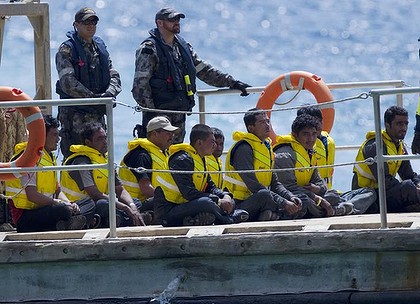Tom Allard

KHODADAD REZAIE has heard two bits of news this month that have left him utterly perplexed.
The ethnic Hazara and recognised refugee was told two weeks ago by the Australian embassy in Jakarta that his application for an immigration visa was rejected.
Yesterday morning, he learnt that the Malaysia plan was, once and for all, dead. Australia will not only process asylum seekers arriving by boat onshore, many will be allowed to live in the community while their claims are being assessed. If proven to be refugees, they will get residency.
”It doesn’t make sense,” Mr Khodadad said. ”If I try here, [the Australian government] say no. If I pay agent money and take boat, they will say yes.”
With the failure of the Malaysian refugee swap deal, the Prime Minister and Opposition Leader have made duelling claims about who will be responsible for an expected influx of boats and for any more deaths of irregular immigrants at sea.
Whoever is to blame, there is no doubt onshore processing provides a powerful incentive for asylum seekers to take the risky voyage to Australia, often in unseaworthy wooden boats.
Australia has about 14,000 refugee places to fill each year. For every arrival by sea, one less can be accepted from places like Indonesia or the scores of refugee camps around the world where an estimated 15 million refugees eke out a precarious existence.
Less than 100,000 of those 15 million can expect to be resettled each year through programs run by the United Nations High Commissioner for Refugees, creating a huge demand exploited by people smugglers, some of whom are highly unscrupulous.
Mr Khodadad twice took boats that sank, thankfully close enough to shore for him to be rescued by Indonesian fishermen. Two other attempts to take boats, he said, were also thwarted.
But, with little prospect of coming through official channels and restrictions on working in Indonesia, he would take another boat – if he had the money.
Returning home to Afghanistan was unthinkable, he said.
”I am Hazara and all the Hazara people in Afghanistan have problems with Taliban, big problems.”
Mr Khodadad is from Ghazni province, where the Taliban control most of the countryside and have a deep hatred of Hazara.
”I would take the road to Kabul and we were stopped by the Taliban,” he said. ”They say if you go to Kabul again, we will kill you … Hazara cannot go to Kabul’.”
Since the High Court decision that forced the government to unsuccessfully go to Parliament with legislation to permit offshore processing, four vessels have arrived in Australia with 392 people on board. Several other trips have been thwarted.
Source and copyright
Read more: http://www.smh.com.au/national/canberras-mixed-messages-push-people-towards-the-boats-20111014-1lp9o.html#ixzz1alukMlNp